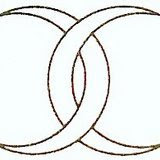To: Grant maker (Smithsonian?)
Re: Concha Castaneda
June 25, 2013 submitted to me October 15, 2013
To Whom It May Concern:
I am writing in support of grant candidate, Concha
Castaneda, Powhatan Native American artist.
She is among the most creative and talented persons I have ever
met. Concha uses both traditional
materials and designs expressed in non-traditional products, and she uses
non-traditional materials in traditional patterns. In a nutshell, Concha approaches art in a
holistic manner, thinking both inside and outside the “box”, her work is both provocative and
simultaneously grounding.
Concha honors the symbols, patterns, and designs of our
Ancestors and has assisted me in carefully and respectfully caring for ancient
artifacts in the American Indian Museum of the Newark Earthworks (when it was a
museum) and I was the Education specialist at the Newark site of the Ohio
Historical Society. When it was time to
clean the display cases, I insisted that only Native Americans descendants
handle the artifacts. I wanted them
thoughtfully and reverently removed and placed on a proper “Homa” (red) cloth
and guarded while the cases were cleaned.
I chose Concha to help me with this endeavor due to her deep regard for
the artwork and handicraft of her predecessors.
I also understand Concha has a visual challenge in that she
has only one eye. It is remarkable that
she has such artistic skills considering her disadvantage. She compensates by tactile recognition (most
of her art is 3 dimensional). In the few
hours that we were engaged in caring for those precious relics, Concha absorbed
a catalogue of shape and design. That
was over 15 years ago, and she has been producing significant work ever since,
reflecting these symbolic archetypes in diverse media.
Concha shows her Native American values not only in honoring
the past ancestors, but also by honoring future generations in her regard for
our Mother Earth. She is engaged in
finding new uses for discarded items, recycling materials is a strong element
of her artistic practice. This resonates
with me on many levels. I have attached
a short story that exemplifies how my elders felt about the subject.
In summation, I believe your investment of time, exposure,
and financial support in Ms. Castaneda’s talents will be rewarded by the
blooming effects of this very special “squash blossom”, my friend, Concha
Castaneda
Most Sincerely,
Merry Carol Hapi (Daughter of Mary Lou Stahl author of The
Ones That Got Away: The Choctaw trail of trials and Weaving Wildly:
The Choctaw Method of Basketry
What Could Be More Indian?
By Merry Carol Hapi
My Chata (Choctaw) grandmother, Ollie
and her sister, my great-aunt Jenny, had been dipping snuff since
childhood. They always had an empty can
in their handbags to discreetly spit into when in church or other polite
company. They could go through a number
of snuff tins in a week, and found all sorts of uses for the empty
containers. Some held beads, some held
pins, fishhooks in others, dried herbs in many.
The lids were useful too. My Taligi (Cherokee) grandfather Elton bent
and folded them for sinkers (“drop that line to the muddy bottom- catch some
catfish hiding there”). That might have
given Aunt Jenny the idea to sew them onto the hem of her dancing dress for the
jingle effect.
When challenged by the Head Dancer at
the Pow Wow, about having snuff lids instead of deer hooves, “that ain’t real
Indian” he said. Aunt Jenny replied
“usin stuff tem others would throw away, if that ain’t Indian, what is?”
Post script: I can't tell you how touched I was at this letter of recommendation. Making my personal squash blossum necklace and concho belt of course has been something that I have been trying to finance for quite sometime. Looking at the ones in the Smithsonian will help me design my own. Of course, I need to get the grant for that to happen...lets not put the "cart before the horse".








No comments:
Post a Comment